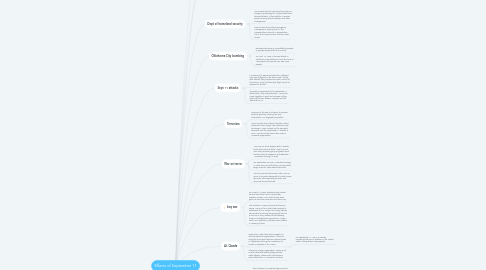Effects of September 11
by S Dreyer

1. Terrorism
1.1. Terrorism is the use of violence to achieve political goals by creating fear and intimidation in a targeted population.
1.2. There are two acts of terror that the United States will never forget, the Oklahoma City bombing in 1995, carried out by domestic terrorists, and the September 11 attacks in 2001, carried out by Osama bin Laden’s al-Qaeda organization.
2. War on terror
2.1. "Our war on terror begins with al-Qaeda, but it does not end there. It will not end until every terrorist group of global reach has been found, stopped, and defeated." —President George W. Bush
2.2. On September 20, 2001, President George W. Bush announced that the country would begin a war on international terrorism.
2.3. This has come to be known as the War on Terror. They were designed to locate known terrorists, intercept terrorist plots, and eliminate terrorist threats.
3. USA patriot act
3.1. This has been an important government resource in the War on Terror. PATRIOT is an acronym for Providing Appropriate Tools Required to Intercept and Obstruct Terrorism.
3.2. The Patriot Act provides expanded authority. The act made changes to existing laws involving the privacy of telephone conversations. It also included money laundering and immigration.
4. Al- Qaeda
4.1. Osama bin Laden founded al-Qaeda, an Islamist extremist organization. It formed originally to support extreme Islamist views in Afghanistan during their resistance to Soviet occupation in the 1980s.
4.1.1. On September 11, 2001, al-Qaeda members took part in attacks on the United States, killing about 3,000 people.
4.2. It became a large organization, made up of smaller cells that would independently make attacks. These small cells became more difficult for U.S. forces to confront.
5. Iraq war
5.1. On March 17, 2003, President Bush issued his final ultimatum to the Iraqi leader Saddam Hussein. Him and his sons were given 48 hours to surrender and leave Iraq.
5.2. The situation in Iraq continued to become worse. Many in the United States wanted a withdrawal of U.S. troops, but many officials worried that removing troops would lead to a civil war in Iraq. Instead of withdrawing troops, President Bush approved a “surge,” which is an addition of 20,000 more soldiers in January of 2007.
6. Afghanistan war
6.1. The U.S. military began Operation Enduring Freedom in Afghanistan. The goal was to destroy al-Qaeda and take down the Taliban.
6.2. Soldiers faced difficult terrain, extreme weather conditions, and determined guerrilla fighters. Early in the war, the United States and its allies were able to push the Taliban government from power.
7. George W. Bush
7.1. George W. Bush, who was the 43rd president of the United States, led the nation after the worst terrorist attack in its history.
7.2. As president, Bush supported large tax cuts and attempted to reduce the United States’ role in international affairs. But, when terrorists attacked the World Trade Center and the Pentagon on September 11, 2001, Bush changed his approach to foreign policy and national security.
8. Oklahoma City bombing
8.1. Domestic terrorism is committed by people or groups based within the country.
8.2. On April 19, 1995, a terrorist attack in Oklahoma City, Oklahoma, took the lives of 168 people and injured over 500 more people.
9. Transportation security administration
9.1. The Transportation Security Administration is an agency of the Department of Homeland Security that has authority over the traveling public in the United States. It was created as a response to the September 11, 2001 attacks
10. Individual rights
10.1. The U.S. government, specifically the National Security Agency (NSA), has also established an operation to monitor phone calls and computer transmissions for evidence of terrorism
10.2. Americans were shocked to find out that the government was searching records of cell phone calls, social media posts,and e-mails.
11. Weapons of mass destruction
11.1. Things have been done to stop the spread of these weapons. The Nuclear Non-proliferation Treaty of 1968 bans countries with nuclear capabilities from helping other nations develop them.
11.2. This is any weapon that can cause death and destruction at a large amount. Examples of WMD include nuclear, biological, and chemical weapons.
12. Dept of homeland security
12.1. The Department of Homeland Security is in charge of protecting the United States from terrorist attacks. It also aids the American people during natural disasters and other emergencies.
12.2. They include the Federal Emergency Management Agency (FEMA), the Transportation Security Administration (TSA), the Secret Service, and the Coast Guard.
13. Sept 11 attacks
13.1. Members of al-Qaeda boarded four different commercial flights on the East Coast. Shortly after takeoff, they hijacked and took control of the planes. They had attended flight school to prepare for this act.
13.2. The public responded to the September 11 attacks with unity and patriotism. Americans came together in grief and outrage as they watched the twin towers’ collapse and the aftermath on tv.



